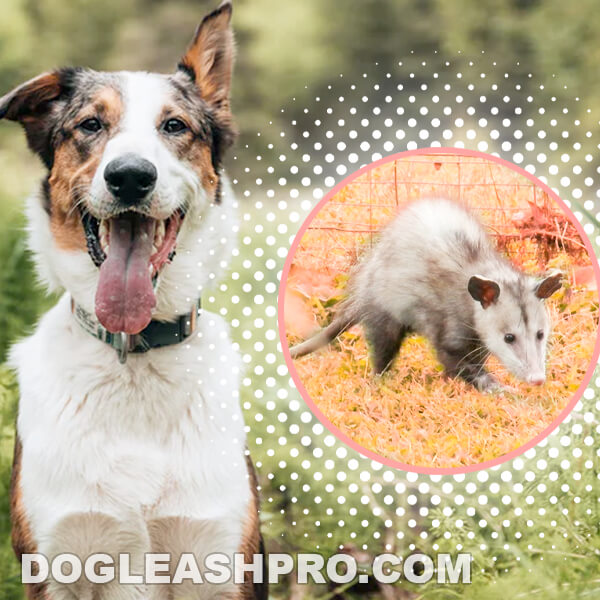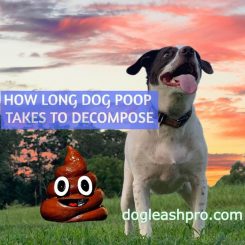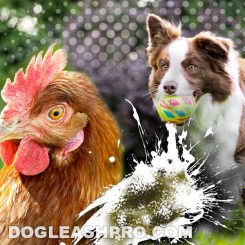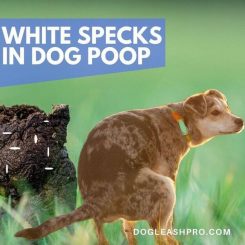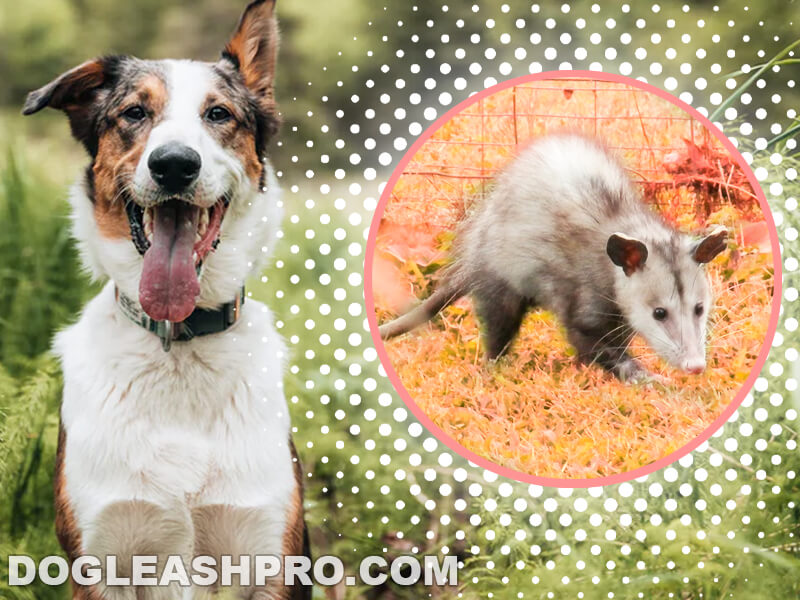
If you’ve ever seen a possum, you’ll know how intimidating they can look with their sharp razor teeth and long sharp claws. Some possums can get as large as a Teacup Chihuahua so many dog owners wonder if their canine friends should be hanging out around these nocturnal marsupials.
Pet owners are also concerned about whether dogs can get diseases like rabies, infections, or worms from being in contact with possums. So are possums dangerous to dogs? Here’s the quick answer.
Are possums dangerous to dogs? Yes, possums are dangerous to dogs. If your dog gets into close contact with a possum, he’ll risk getting scratched or bitten. In rare cases, dogs can even get sick from eating a possum. The good news is that possums are smaller than most dogs and they would rather avoid contact or confrontation at all costs.
Table of Contents
Are opossums dangerous to dogs? How dangerous are they?
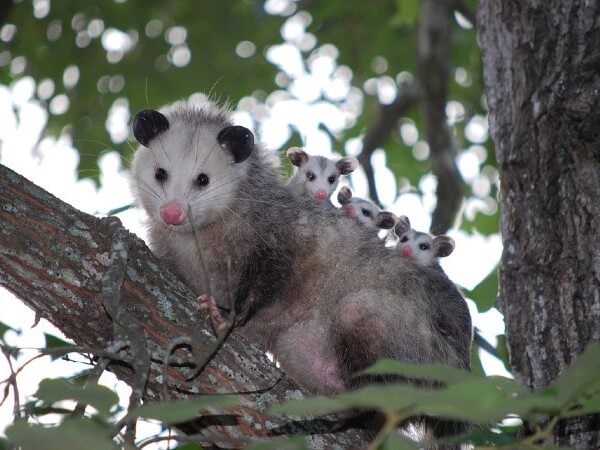
As mentioned above, opossums are dangerous to dogs if an encounter between the two occurs and they start to fight and attack each other. However, you’ll be glad to know that opossums are generally not confrontational.
Are possums afraid of dogs? Yes, when opossums see a dog, they prefer to run away. Their small size and submissive and docile manners mean they are usually of no threat if the dogs leave them alone.
However, when the opossums feel the need to defend themselves, they will instinctively show their teeth to try to scare away any dog that gets a bit too close to them.
This behavior is normal. If a stranger comes up to your house, your guard dog may start putting their tails between their legs, growling, showing their teeth, and barking loudly as well.
So can a possum hurt a dog? Usually, opossums are of no threat to dogs as long as your canine friends don’t go chasing them and getting all up in their space.
With that said, there are some cases when opossums can be dangerous to dogs. Let’s go over that next.
Will a possum attack a dog?
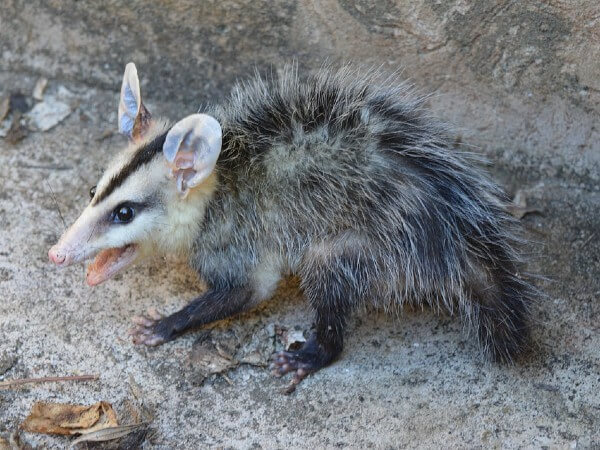
While most possums will run away from dogs to avoid any encounter and confrontation, there are cases of fierce possums that have attacked dogs. So, do possums attack dogs?
Not exactly. In most instances of possums attacking the dog, it’s usually because they were trying to defend themselves. The possums are cornered with nowhere else to go, can’t escape, and with no other choice, they attack the dog to try to save themselves.
Another way that possums will try to defend themselves when confronted by dogs is to play dead. The possums at this point may have full anxiety from this potentially dangerous situation. What results is the possum going into a comatose state from being in shock and they can be out for at least four hours.
When possums play dead, it’s as if they are really dead. That’s because their body actually becomes limp and a green slimy mucus secretes from their anal glands. This mucus has such a rotten foul smell and it tells the prey to stay away.
A possum usually does not respond this way. But when they are in such a dangerous situation and get stressed out, their body will naturally react this way. It’s a way for them to save their lives.
However, since a possum will be unresponsive for up to 4 hours while in this state, it can also mean that they are at risk of passing in other ways.
For instance, if the possum was to play dead and end up going limp and unresponsive in the middle of the road, they could get run over by drivers. Drivers may assume that the possum is already dead so they don’t bother to drive around this cute tiny creature and may end up actually driving over it.
In other cases, if the possum plays dead and ends up in someone’s front yard, the homeowner may assume this tiny marsupial is already dead so why not bury it or throw the body away in the trash.
Our canine friends are curious in nature and some like to make new friends. So you can expect some dogs to get close to the possum. If the possum reacts by showing its teeth, your dog may also react by attacking it too. At this point, the little marsupial may play dead and will be in this state for 4 hours.
You might also like: How To Cure Parvo Without A Vet For Your Dogs
So, my dog attacked a possum what should I do?
If you know your pooch has encountered a possum and attacked it, there are three things you can do (and in this order):
1. Both you and your dog should get away from the possum immediately
First, you’ll want to gain control of your dog. If he wasn’t on a leash and was allowed to walk freely, you’ll want to call out to him and get his attention. Then, you’ll want to clip your leash onto their collar so you can walk him away from the possum.
When you leave the possum alone, it will give the possum the time it needs to come back to life if it is playing dead.
2. Take a closer look and check for possum bite marks on dog
You’ll want to check to see if there are any possum bites on your dog’s face, behind the ears, body, and legs for any wounds such as bites or scratches. If you do see them, that means your dog got bit by a possum and you’ll want to contact your vet next.
3. Contact your veterinarian as soon as possible
The sooner you can get your pooch to the vet, the better. Your vet will immediately clean the scratches or wound and prescribe necessary antibiotics.
We highly recommend that you take a look at your dog’s health and vaccination documents before bringing your dog to the vet. Check to make sure your pooch is up to date with his vaccination shots and show the paperwork to the vet. This is crucial because it allows the vet to determine if your K9 friends need further booster shots.
Do dogs scare away possums?
Yes, dogs generally do scare away possums. Possums usually prefer spaces where there’s no direct danger to them. They see any animal larger than them as a threat, especially animals that are moving and getting close to them.
For this reason, possums will avoid homes and backyards where there are dogs. In some cases, if the possum is feeling very hungry and needs food immediately, then they will risk their safety for some food even though they know they may be in danger.
Other times, they aren’t aware that there are dogs nearby. They are scavenging for food only to have dogs running toward them and chasing them.
Dog owners that grow fruits in their backyard can expect possum sightings since possums love to eat fruits and insects – both of which could be found in your backyard.
Possums also like to eat grains and leftover food. If you have a compost bin with leftover food or thrown away grains in the garbage bin, the possums may get into them as well.
Most dogs will finish their meal. But if they are feeling sick or have leftover food, remove or discard it. Having leftover dog food sitting outside is an invitation for possums to stop by. They’ll love any food they can get.
My dog bit a possum! Will he get ill?
When a dog bites a possum, it’s pretty rare for dogs to get ill. However, there are cases when a possum carries a range of diseases or illnesses that can be transmitted to your pooch if he bites the possum. The disease or illness transmitted to your furry friend can be potentially fatal.
This is why it’s crucial that your canine friends are up to date with their vaccinations. In the event that your pooch bites a possum, the vaccination he received will protect him from serious consequences.
What happens if a dog bites a possum?
If a dog bites a possum, there’s a possible chance that the illnesses and diseases can get passed on to the dog from the possum.
Do possums carry diseases fatal to dogs?
Yes, some of the illnesses and diseases that possums carry can be fatal to dogs. They include:
- Chagas disease: Chagas disease is caused by a one-celled parasite called Trypanosoma cruzi. They are tiny and naked to the human eyes. Possum may carry this parasite with them to your backyard or garden and it can transfer onto your dog.
- Coccidiosis: Coccidiosis is especially dangerous to young puppies. Coccidiosis in puppies causes severe infection. Usually, these parasites live in the dog’s intestinal wall. Sometimes, dog owners are not aware because dogs won’t have symptoms even though they have Coccidiosis.
- Tuberculosis: If your pups bite into a possum, they are also at risk of getting tuberculosis or TB. This is rare, but it can happen. Dogs with Tuberculosis will experience symptoms such as harsh and loud coughing, loss of appetite, and high temperature.
- Trichomoniasis: Since possums are out in the wild, they could pick up Trichomoniasis and this can get passed on to your pooch. It’s usually caused by nematode, which is a type of worm. Dogs with Trichomoniasis will have cysts in their muscle tissues.
- Leptospirosis: Lastly, dogs can also get Leptospirosis. Leptospirosis is a bacterial disease and it is often severe and fatal because it can damage your dog’s organs. Dogs with Leptospirosis may experience symptoms such as jaundice, muscle pain, and high temperature.
Since possums are out in the wild, they can also carry fleas. So fleas can also get passed onto your dog.
Possums tend to eat ticks. In fact, in a 3 month period, a single possum can eat as many as 5,000 ticks. So ticks are usually something you don’t need to worry about if there’s possum around.
RECOMMENDED: Engorged Tick Fell Off Dog (Here’s What To Do!)
If you ever see a possum in your backyard or garden, make sure your dog is fully vaccinated. Your dog may be in contact with the possum both directly and indirectly if there are possums in your garden.
For instance, the possum may poop or pee in your garden. When your furry friend comes into close contact with the feces or urine, he or she may be at risk of getting the disease. By being up to date with all the vaccinations recommended by the vet, your pooch will be protected from these harmful infections.
It’s not just your dogs you have to worry about if there are possums in your garden or backyard. Many of the conditions and diseases we’ve listed above can be transmitted from possums to people as well.
If you have possums in your backyard, be sure to consult with your pest control company so that the possums don’t become a problem for you and your pooch.
You might also like: White Specks in Dog Poop (Not Moving) – What Should You Do?
Can a dog get rabies from biting a possum?
Your dog may get rabies from biting a possum if the possum is infected with rabies. The majority of the time, possums are rarely infected with rabies so there’s really only a slim chance that your dog can get rabies from contacting a possum in any way, whether biting a possum or attacking it.
Many believe that possums are rarely infected with rabies since their body temperature is usually much lower than what is considered normal for warm-blooded animals.
Sometimes it may seem as if the possums may have rabies because when they are trying to defend or protect themselves, they may hiss and have foams coming out of their mouth. This may appear as if they have signs of rabies. But this foaming and hissing is really their defensive strategy to scare their prey.
Is possum poop bad for dogs?
If you know your dog has a habit of eating poop (Coprophagia In Dogs), then you’ll want to try to keep possums away from your backyard. Possums that hang around in your garden will likely poop on your grass as well.
Some dogs may develop a gross habit of eating poop and may enjoy eating possum poop. To us, it’s disgusting, but some dogs take delight in consuming it!
Can my dog get sick from eating possum poop?
If your K9 pals accidentally consumed possum poop, they should be fine and won’t experience that many problems.
However, it becomes problematic when your precious pooch becomes obsessed with the possum poop and will purposely look for it. If you suspect your pooch is purposely seeking out the possum poop, you’ll want to consult with your vet.
Your vet may ask you to bring your dog in for a check-up to find out if there are any health issues such as Cushing’s disease, diabetes, or parasites that are causing your dog to eat poop.
If you see possum poop in your backyard or garden, try to remove it before your furry friends dig their noses into it. Try not to disturb the poop too much to prevent the release of bacteria and spores. This will prevent diseases like salmonella or leptospirosis from being transmitted to your pooch.
If you’re cleaning up the possum poop in a confined area such as the attic or below the patio, be sure to wear gloves, long sleeve shirt, and pants. Your skin should be covered fully. You’ll also want to wear a breathing mask to prevent inhaling any bacteria or spores. Goggles are also great to prevent eye infections during the clean-up.
Collect all the possum poop and using a container or a sealed bag, dispose of the poop in it.
Can dogs eat possums?
No, dogs should not eat possums. Can dog get sick from eating possum? Yes, there’s always a risk when your four-legged friends eat these small marsupials. If the possum carries illnesses and diseases or had been poisoned prior to your dog attacking it and eating it, then you’ll want to contact the vet as soon as you can.
If your dog eats a dead possum, he or she may be at risk of getting the following symptoms:
- Diarrhea.
- Vomiting.
- Sickness.
- Upset stomach.
Because of this, you’ll want to make sure your furry friend isn’t anywhere near the possums, to begin with, in order to avoid attacking it and then biting or eating it.
So, are possums dangerous to dogs?
As we can see, possums can be dangerous to dogs so it’s always best to keep our furry friends away from them. Luckily, possums are timid little animals that would rather avoid confrontation at all costs. In most cases, they will run away when they see your dog in order to avoid any encounter.
DISCLAIMER: THIS WEBSITE DOES NOT PROVIDE MEDICAL ADVICE
The information, including but not limited to, text, graphics, images and other material contained on this website are for informational purposes only. No material on this site is intended to be a substitute for professional veterinary advice, diagnosis, or treatment. Always seek the advice of your veterinarian or other qualified health care provider with any questions you may have regarding a medical condition.
Resources:
https://en.wikipedia.org/wiki/Opossum

With over five years of specialized experience as an animal writer, my expertise lies in dog nutrition, health, behavior, grooming, and training. I am dedicated to delivering helpful and informative content that caters to the well-being of our furry friends. My primary goal is to empower pet owners with knowledge and ensure our canine companions thrive in health and happiness. In my free time, I love volunteering at local dog rescue centers.
